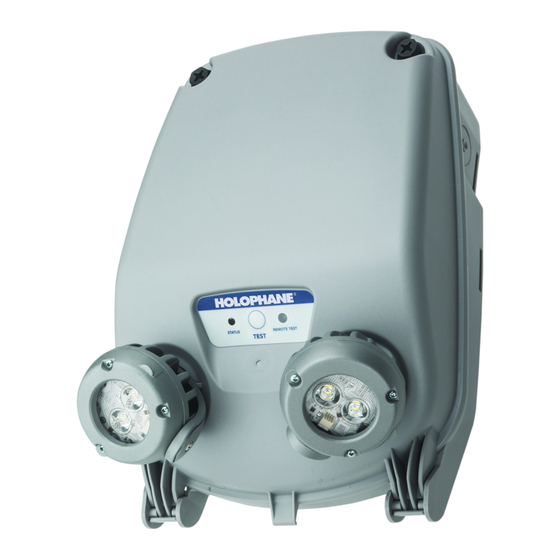Acuity Brands 912-00031-002 Manual - Page 4
Browse online or download pdf Manual for Lighting Equipment Acuity Brands 912-00031-002. Acuity Brands 912-00031-002 20 pages. Emergency lighting unit

NOTE: Emergency lighting systems should be tested in
accordance with NFPA 101 or as often as local codes
require, to ascertain that all components are operational.
NOTE: Allow batteries to charge for 24 hours before initial
testing.
Manual testing:
If the batteries are sufficiently charged, either press and release
the "TEST" button or use the RTKITHLP (remote tester
accessory for SDRT units only) on the bottom of the unit to
activate a 60-second test, during which the lamps will turn on.
Triggering either option a second time will enable a 90-minute
tests indicated by 5 flashes of the lamps. Triggering either
option a third time will disable manual testing.
Self-Diagnostics (SDRT feature)
Units with this option automatically perform a 5-minute self-
diagnostic test of the charging electronics, battery, and lamps
every 30 days, and a 90-minute test every year, indicating
system status as shown in the table at right. First self test
occurs after 15 days of continuous AC Power.
Postponing a self-test:
If an automatic self-test occurs at a time when it is not desirable
for the unit lamps to be on, it can be postponed for 8 hours
either by pressing and releasing the "TEST" button or by using
RTKITHLP (remote tester accessory).
Cancelling emergency operation:
While in emergency Mode, press and hold the "TEST" button for
several seconds or activate using the RTKITHLP (remote tester
accessory), during which the status indicator will flash until the
lamps turn off. This restores the AC Reset state in which the
unit is shipped.
Load-Learning feature:
Self-Diagnostic units automatically 'learn' their total connected
lamp load during the first scheduled self-test (~15 days). The
load-learn clear process can be initiated manually and should
be initiated whenever the total connected lamp load of the unit
is changed, or potentially troubleshooting a lamp error (unit
indicates a lamp error yet all lamps are operating correctly) or a
lamp is replaced.
To clear the current load-learn, press and hold the "TEST"
button for 7 seconds (count green flashes), during this period
the lamps will turn on. After 7 seconds, release the button, the
lamps will turn off within 2 seconds indicating load clear is
complete. If lamps stay on longer, the load clear was not
successful and the process should be repeated. A new load
learn will automatically take place at the next discharge from a
fully charged state (solid green status indicator).
Clearing a failure indication:
After a failure condition has been corrected and power is
restored to the unit, clear the failure indication either by
pressing the "TEST" button once or by using the RTKITHLP
(remote tester accessory).
TESTING and MAINTENANCE
IMPORTANT BATTERY INFORMATION:
Batteries are perishable items. For best results, it is
recommended that the batteries receive an initial charge within
the first twelve months of the manufacture date of the fixture. In
many cases, batteries beyond the initial charge recommendation
time frame will recover if fully charged soon after installation. If
such a battery does not recover after a full initial charge, it
should be replaced. The manufacture date can be found on the
outside of the unit packaging and on the product label as part of
the Date Code / Series. The first two digits in the date code
represent the year and the second two digits represent the
month.
Unit Status Indications
The "TEST" button illuminates to indicate the following conditions:
Indication:
Off
Flashing green
Solid amber
Solid green
Flashing R / G
1x red flashing
2x red flashing
3x red flashing
Flashing R/Amber Unable to charge
Solid Red
Remote Test (SDRT):
Units with the self-diagnostics/remote test feature allows
manual test activation using a laser pointer. Aim the laser
beam straight onto the circular area labeled near the "TEST"
button for a few moments to activate a 60-second test. (See
also "Manual testing") A test in progress may be cancelled by
aiming the beam at the test area again. NOTE: The remote
tester should not be used to initiate the Load Learning feature.
Status:
Unit is off
Unit is in Emergency operation or Test
Battery is charging
Battery is fully charged
Manual test, battery not fully charged (SDRT)
Battery failure (SDRT)
Lamp failure (SDRT)
Charger / electronics failure
(SDRT)
Battery is disconnected
(RTKITHLP sold separately)
Remote Test: aim laser
pointer here
"
TEST" button
page 3
